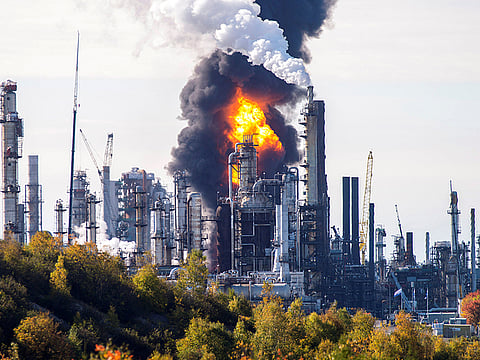Reducing the risk of refinery mishaps where possible
Even the highest precautionary standards can still be undone by oversight

Another oil refinery explosion is in the news and this time at Canada’s Saint John refinery, the largest in the country.
It happened on the morning of October 8, a national holiday, while 3,000 workers were involved in a major turnaround of the refinery. Luckily, it caused only a few workers to be hospitalised with non-life threatening injuries.
The cause of the explosion is still undetermined, especially as monitoring processes were in order even after the fire was extinguished five hours later. The management is working with government agencies to determine the cause and take effective measures for it not to happen again. The facility employs about 1,400 people and is capable of processing 320,000 barrels a day.
The refinery, which opened in 1960, has suffered four major incidents in the last 20 years.
Crude oil by its nature is dangerous to handle and in refineries, the high processing temperature and pressure adds to the risk. Therefore, safety standards must be raised ever higher. One must be more aware of oil refinery fires because they can cause extensive damage to installations, loss of life and health hazards to the neighbourhood. In this case, residents were asked to stay at home for the initial hours of the incident until no further risk was seen.
The explosion occurred in a diesel hydrotreating process unit of 56,000 barrels a day capacity, where the necessity to remove sulphur from the product demands high temperature and pressure, with the use of catalyst to react with large volumes of hydrogen.
Five weeks earlier, an explosion and fire had rocked the German oil refinery in Ingolstadt, where eight people were injured and 1,800 evacuated from their nearby homes.
Six years earlier, an explosion and fire at the Amuay refinery in Venezuela after a major gas leak killed 48 people, injured more than 200 and made many homeless. The refinery is one of the largest in the world, processing some 645,000 barrels a day.
Yet another major incident in 2012 engulfed the Richmond refinery, one of the largest in the US. The fire resulted in thousands of residents being sent to hospital for treatment after inhaling of what may have been toxic releases or from the heavy smoke that engulfed the area.
In Kuwait, the Shuaiba oil refinery, which was commissioned in 1968 and reached a capacity the mid-1990s of 200,000 barrels a day, suffered a serious fire in 2014 which may have expedited the decision for its closure.
In 2005, 15 people were killed and more than 100 injured during an explosion at a BP oil refinery in Texas City where the refinery was being restarted after maintenance. Start up and shutdown times are riskier and extra precautions are normally taken.
The Feyzin refinery in France was severely damaged in 1966 after a small mistake in draining a liquid petroleum gas (LPG) spherical tank. The resulting vapours were ignited by a passing car 160 meters away and the storage sphere was enveloped in a fierce fire, killing 18 and injuring 81 others and destroyed five more tanks.
The history of hydrocarbon processing is full of similar or more severe incidents, especially if the safety process is not managed properly starting from the location and design stages of the plant to the daily running of production.
The organisation of fire brigades cannot be left to the plant’s management independently, but need a high degree of coordination and disaster planning with other civil defence brigades. Some managements tend to cut the number of firefighters or their equipment for budgetary reasons.
Let me say that such incidents must make us aware of the risks involved in refineries and other hydrocarbon facilities. Every effort should be made to locate plants in the right place and provide them with the utmost protection, including the intensive training of operators, maintenance and firefighting personnel.
The industry in our region are no less sophisticated than their counterparts in developed countries. Let us make use of the painful experience of others rather than repeat their mistakes.
Dr Saadallah Al Fathi is former head of the Energy Studies Department at the Opec Secretariat in Vienna.



